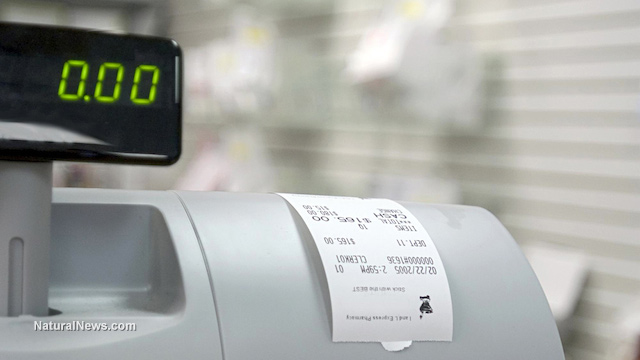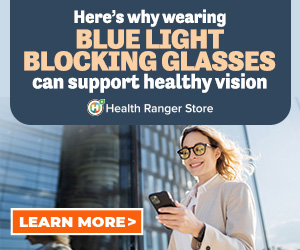EU lowers safety limit for endocrine-disrupting chemical BPA
Friday, February 27, 2015 by: Ethan A. Huff, staff writer
Tags: bisphenol A, endocrine disruptors, safety limit

- Newly released JFK files reveal Pentagon's role in creating Lyme disease and covid in the same lab
- Trump's greatest betrayal so far: Accelerating Middle East wars, silencing dissent, and serving Zionist masters
- The hidden dangers in your kitchen: How cooking methods impact diabetes, cancer and aging
- STARDUST, a secretive Israeli-US startup, plans risky solar geoengineering experiment to BLOCK OUT THE SUN
- DEADLY DECEPTION: How COVID vaccines increased mortality rates and why authorities hid the truth
- Arkansas embraces medical freedom with landmark ivermectin law
- CDC finally halts $11 billion COVID funding scam as health officials admit the ‘pandemic’ was a fraud
- Lab leak confirmed? Boris Johnson's stunning reversal on COVID origins sparks global debate
- Home gardening for preppers: A beginner's guide to growing your own food
- Unraveling the paradox: Why intelligent individuals fall prey to everyday blunders
- GAIN-OF-FUNCTION CAT-BIRD-FLU now on the rise as nearly a dozen cats in Colorado "test positive" for Bird Flu due to contaminated cat food
- YouTube’s double standard: CEO defends censorship while claiming free speech champion status
- “Feel G.O.O.D. Gut Health Program” on BrightU: Why elimination diet is good for you
- Cartels shift tactics: Kidnappings and organ trafficking surge as border crossings plummet under Trump policies
- Why you should think twice before buying mainstream toothpaste formulas
- “Rent-a-womb” scandal: How China is exploiting U.S. birthright citizenship for long-term espionage
- Was JFK's assassination orchestrated by a CIA double agent? New evidence points to James Angleton as the “architect”
- Record honeybee deaths devastate U.S. agriculture, pesticides under scrutiny
- Newly released JFK files reveal Pentagon's role in creating Lyme disease and covid in the same lab
- Elon Musk: Aliens could be here on Earth RIGHT NOW
- Festive flavors: The sweet history, nutritional profile and health benefits of pecan pie
- Trump reverses course on Gaza plan, says “nobody is expelling Palestinians”
- Reclaim your health: How midlife exercise reverses years of inactivity
- Big Pharma's $8 Billion bribery scheme exposed: how doctors are pushed to prescribe junk science, not heal
- Boys are back in town: Trump’s patriotic alpha crew takes the wheel while toxic females ride in the backseat
- EPA advisor admits the agency is funneling billions to climate groups ahead of Trump’s return to White House
- Space war brewing? Russia threatens to destroy Starlink satellites
- Survival 101: Effective EMF blocking techniques
- A lack of integrity in Academia: Harvard professor found GUILTY of fraudulent research to promote CRT theory
- Mike Adams Sermon 66: God will DESTROY ISRAEL for its wickedness
- 5 Simple steps to boost your brainpower: How to strengthen executive function in a distracted world
- Rep. Nancy Mace introduces bill to ban biological males from female facilities on federal property
- Sugarcane extract superior to cholesterol-lowering drugs?
- WHO focusing more on policing speech about public health and implementing global surveillance systems
- Pilots report mysterious lights 'moving at extreme speeds' across Oregon skies
- Dr. Mike Yeadon releases 15-minute testimony - WATCH - about genocidal intent of COVID “vaccines”
- EPA advisor admits the agency is funneling billions to climate groups ahead of Trump’s return to White House
- The Health Ranger releases “Vaccine Zombie” song and music video, using AI-animated zombies for the music video
- California's social media censorship law struck down: A victory for free speech or a threat to online safety?
- Dr. Mike Yeadon releases 15-minute testimony - WATCH - about genocidal intent of COVID “vaccines”
- The pandemic as a tool for INDOCTRINATION: Understanding “The Indoctrinated Brain” by Dr. Michael Nehls
- Florida takes a stand: DeSantis proposes permanent ban on mRNA vaccine mandates
- Mike Adams releases country western hit single: Goin’ Back in Time is Comin’ Home
- Mike Adams releases music poetry sensation: A Child of God
- “Why we influenced the 2020 elections”: Facebook files reveal the coordinated effort to bury the Hunter Biden laptop story
- RFK Jr. clears key hurdle: Sen. Susan Collins backs controversial HHS nominee, signaling a new era for health policy
- Unpacking the Lies That We’ve Been Fed – new song and music video released by Mike Adams, the Health Ranger
- Mike Adams releases new song and music video: Nothing More Disgusting Than a Globalist
- Newly released JFK files reveal Pentagon's role in creating Lyme disease and covid in the same lab
- Congratulations to the FULLY UNVACCINATED as you resisted the COVID-19 PROPAGANDA MACHINE fueled by over $100 BILLION
- Michigan sheriff announces criminal investigation into 2020 election crimes, Dominion Voting Systems
- Israeli soldiers accused of even more torture and abuse in the West Bank
- Migrants are taking advantage of recent hurricanes to scam residents and loot their homes
- House Intelligence Committee calls for the ARREST and PROSECUTION of Dr. Anthony Fauci
- Red Cross issues warning to stop blood plasma donations from vaccinated people
- Scientists confirm: GENIUS brain function can be spontaneously unleashed in humans without any apparent cause
- EPA advisor admits the agency is funneling billions to climate groups ahead of Trump’s return to White House
- HYSSOP: What research reveals about the health benefits of this ancient holy herb
- Two containers with completed ballots fall out of truck in Florida
- Fully vaccinated about to see “tsunami” of illness and death, warns virologist
- Global leaders unite to clamp down on “misinformation” with UN-backed Cascais Declaration
- BREAKING: 2025 NDAA authorizes mandatory military draft of WOMEN across America… as Pentagon pursues global NUCLEAR war with both Russia and China at the same time
- Michael Yon warns of a ZIONIST TAKEOVER in Trump’s second administration
- BOMBSHELL: DNA testing kits are a SCAM to develop ethnic-specific bioweapons
- Ozempic and Wegovy weight loss drugs are injectable LIZARD VENOM PEPTIDES that may unleash a devastating wave of organ failure… side effects align with symptoms of SNAKE BITES
- Israeli soldiers accused of even more torture and abuse in the West Bank
- These 13 countries just signed an agreement to engineer a global FAMINE by destroying food supply
- NASA admits that climate change occurs because of changes in Earth’s solar orbit, and NOT because of SUVs and fossil fuels
- RFK Jr. clears key hurdle: Sen. Susan Collins backs controversial HHS nominee, signaling a new era for health policy
- Sermon 30: How Jesus reveals Caesar’s FAKE CURRENCY and FALSE AUTHORITY
- Coriander seeds: Ancient medicine backed by modern science
- Arizona officials claim Maricopa County needs 10-13 days to tabulate results of the election
In a recent announcement, the EFSA declared that BPA "poses no health risk to consumers of any age group (including unborn children, infants and adolescents) at current exposure levels." It also proclaimed that dermal exposure from things like thermal paper receipts and money is "under the safe level," even though in the same breath the group admits that it really doesn't know how much BPA is being absorbed through the skin, on average.
The EFSA claims that it looked at all the available science regarding BPA in coming to this irresponsible conclusion, which puts public health at considerable risk by deceitfully assuaging people's fears about exposure to this noxious chemical substance. There is substantial evidence in the scientific literature suggesting that BPA is responsible for triggering a variety of health conditions, including but not limited to breast cancer, reproductive disorders, neurobehavioral problems and immune suppression.
Did the EFSA even look at any of this evidence when quantifying the potential health risks associated with BPA? The regulatory body says it consulted and engaged with "national authorities and stakeholders" during the risk assessment process, but its findings don't seem to reflect the truth about this widely used chemical, mainly that it's a high-risk toxin both at high and low exposure levels.
BPA defies typical dose-response toxicity model, is harmful at very low levels
Whenever the safety of a chemical is called into question, the skeptics crowd is quick to scoff at it, declaring in predictable smugness that "the dose makes the poison" -- so there! Except that in the case of BPA, science has shown that very low doses of the chemical are highly toxic, a phenomenon known as a non-monotonic dose response.Put simply, exposures to extremely low levels of BPA have been found to be uniquely toxic in ways that are not observed at higher exposure levels. One particular study published in the journal Environmental Health Perspectives (EHP) found that acute exposure to environmentally relevant low doses of BPA promotes the formation of heart disease in females.
Another study, published in the journal Endocrine Disruptors, confirmed this as well after identifying more than 450 studies showing low-dose exposure to BPA to be harmful to humans. Researchers involved in this evaluation put it this way:
"Based on all available studies, we are confident that consistent, reproducible, low dose effects have been demonstrated for BPA. We conclude that the doses that reliably produce effects in animals are 1-4 magnitudes of order lower than the current LOAEL [lowest observed adverse effect level] of 50 mg/kg/day and many should be considered adverse."
Interestingly, the EFSA lowered its "tolerable daily intake" (TDI) for BPA considerably just after declaring the chemical to be safe at current exposure levels. According to the announcement, the group's new TDI for the chemical has been reduced from 50 micrograms per kilogram of body weight per day to 4, a 92 percent decrease.
"EFSA will reconsider the temporary TDI when the results of long-term research by the US National Toxicology Program are available for evaluation in two to three years," the group announced.
Sources:
http://www.efsa.europa.eu
http://ehp.niehs.nih.gov
http://www.sciencedaily.com
http://www.tandfonline.com
http://www.foxnews.com
http://www.uofmhealth.org
http://www.newsweek.com
http://www.medicaldaily.com
http://science.naturalnews.com
Bisphenol A at FETCH.news
Get independent news alerts on natural cures, food lab tests, cannabis medicine, science, robotics, drones, privacy and more.
Take Action: Support Natural News by linking to this article from your website
Permalink to this article:
Embed article link: (copy HTML code below):
Reprinting this article:
Non-commercial use OK, cite NaturalNews.com with clickable link.
Follow Natural News on Facebook, Twitter, Google Plus, and Pinterest
Science News & Studies
Medicine News and Information
Food News & Studies
Health News & Studies
Herbs News & Information
Pollution News & Studies
Cancer News & Studies
Climate News & Studies
Survival News & Information
Gear News & Information
News covering technology, stocks, hackers, and more



"Big Tech and mainstream media are constantly trying to silence the independent voices that dare to bring you the truth about toxic food ingredients, dangerous medications and the failed, fraudulent science of the profit-driven medical establishment.
Email is one of the best ways to make sure you stay informed, without the censorship of the tech giants (Google, Apple, Facebook, Twitter, YouTube, etc.). Stay informed and you'll even likely learn information that may help save your own life."
–The Health Ranger, Mike Adams













































